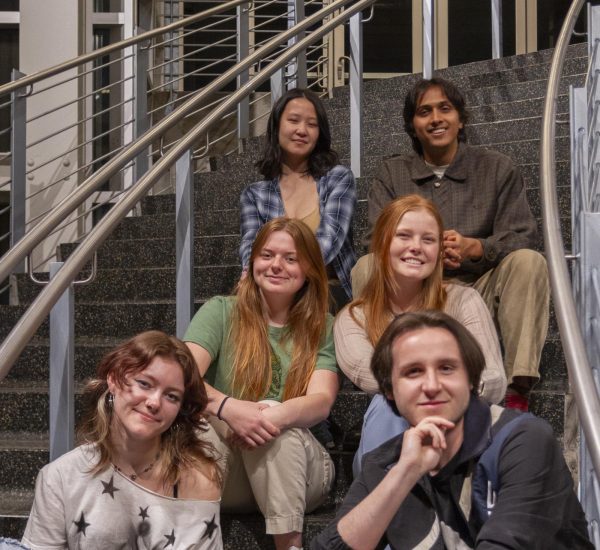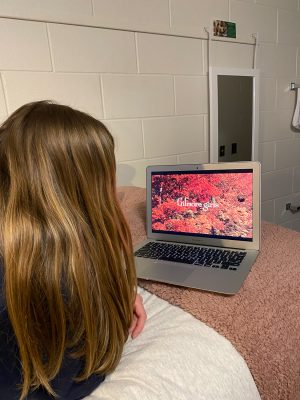By Emily Howland
The Eco House is Macalester’s newest themed house. The house has received media attention from The Villager, Minnesota Public Radio, Fox-9 News and The Mac Weekly in its first semester housing students. Renovated during the summer to be more energy-efficient and environmentally conscious, the space houses four students. Two of the house’s residents, Austin Werth ’09 and Avery Bowron ’10 gave me the real dirt on how they live “eco,” the worm bin, and what’s in store for the future. The Mac Weekly: How did you decide to live at the Eco House?
Werth: I was kind of involved in the project beforehand. There was an advisory committee that was set up by [Environmental Studies professor] Chris Wells. I was on that and I was informed when the process was happening. Early on we were not getting enough applications so I said ‘why don’t I apply?’
TMW: What was the selection process to live at the Eco House like?
Bowron: They asked you if you would be available to live in the house for one semester or the full year and why you were interested and what you would contribute.
TMW: Were there prerequisites to living in the house?
Werth: I imagine the selection was very intuitive. They set it up right before room draw. The warning for the application was very last minute.
Bowron: I found out about the opportunity about 3 hours before the applications were due.
TMW: What does living here entail?
Bowron: In general it’s not that much different than living in other campus housing, other than it is a house, there’s a lot more room and you prepare your own food. We’ve been trying to buy most of our food organic and local. We’ve been shopping at Mississippi Market and occasionally at the St. Paul farmer’s market and that’s allowed us to eat very well. We prepare dinners for each other five nights a week-every night there are classes the next morning.
Austin: We all enjoy preparing our own food and enjoy doing it so we can work with raw ingredients.
TMW: Was anything set up about how you need to live?
Bowron: We were told that as the initial residents of the house we were supposed to help invent that vision for the future. It’s not something where we’re being dogmatic about it-like we don’t have to eat local, it’s just a preference.
TMW: Other than eating locally, how are you setting the precedent for incoming groups?
Werth: We’re still getting ourselves organized a little bit. Most of the day-to-day things we’ve done are food-related. We have a worm bin in the basement for our food scraps. That came with the house. We trade off worm composting. What we all talked about and agreed on for the first year is to reflect on what we’re doing in terms of defining what an “eco house” is. We talked about writing that down in a journal or something we will pass on. We haven’t formally started it yet. We will have a meeting and try to reflect on where we are with this and what is “eco” about what we do and where we can go with this in the future.
TMW: How do you deal with the worm bin?
Bowron: You just have to feed the worms and cut food up if it’s too big and drain the worm bin so it doesn’t stay too moist.
TMW: Have you killed any worms?
Bowron: No, but we had a smell issue downstairs. It has gotten better. We’re figuring it out.
TMW: Is the compost in the basement?
Werth: There is a bin that’s part of [the] MULCH [garden] down the street that we throw our compost in.
TMW: Is there anything you’ve changed drastically in your life by living here?
Bowron: Last year I lived in a forced triple in Dupre so that’s pretty drastic. There’s a lot less social interaction that happens because there’s a barrier between the house and campus. You have to make it happen if it’s going to happen. In the dorms people are doing stuff all the time. It’s a double-edged sword because it’s very nice to have quiet but to get that social interaction you have to make an effort.
Werth: I can’t say I’ve made a lot of huge changes. The house itself is unremarkable. It doesn’t stand out. It’s not showy or flashy. A lot of the improvements are about practical things. A lot of “eco houses” spend a lot of money on being very technological and showy. For this house they had a fixed budget and wanted to make the house practical and applicable so that any homeowner could do a lot of these things. This is something any individual could do. I hope what this turns into is that we don’t do hugely drastic things but we do them in a conscious way in terms of thinking about being aware of where our food comes from.
Bowron: And along those lines, being aware of how the little adjustments work toward larger change. Like having the house well-insulated and having efficient appliances saves energy and money. We set the thermostat at 60 degrees. I turned the heater off in my room in Dupre last year so this is warm for me.
TMW: Do you think that students are aware of the Eco House?
Bowron: I think it’s growing. People ask me about it saying, “Hey you live in the Eco House?” A lot of first years have talked to me about it. People know about it but they don’t know what it really is.
TMW: What would you say to someone to promote the Eco House?
Werth: What’s coming up is a $5,000 grant from the Xcel Foundation for community outreach. There will be a series of meeting and workshops with community members to talk about what would be the physical stuff done on the house and the cost effectiveness. That money will go toward a couple of events. There will be a large kickoff event at the Campus Center for the larger community. Right now the advisory committee for this is the residents of the house, Chris Wells, [High Winds Fund director] Tom Welna and Justin Lee ’08. The advisory committee will decide what happens with this grant. I also emphasize the fact that it’s a work in progress. It is a very experimental year.
TMW: Aesthetically, how is the house environmentally sustainable?
Werth: They installed new insulation and a solar hot water system which is the panels on the garage behind the house. That is for domestic hot water-showers and baths.
TMW: Do you have laundry?
Bowron: Yes. All of the appliances are in the top ten percent of the energy star rating system. They purposefully didn’t pick the best ones because as you get to the top the price shoots up dramatically.
TMW: On a normal weekend do you have people over?
Bowron: The biggest things we’ve done are have friends over for a nice dinner. Last Friday night we had an Eco House and Veggie Co-op pot luck.
Werth: The biggest outreach we did was formal tours of the house two weeks ago. The Minnesota Solar Energy Society has tours of sites with solar energy. A bunch of people stopped by.
TMW: Are there any major challenges you’ve faced in living here?
Bowron: Probably the biggest challenge is facing the sheer volume of media requests.
TMW: Are you all in agreement about how to live with less impact?
Werth: Even before we got here we were on the same level with the kind of things that we thought would be good things to do. It was clear that we didn’t want to waste things. It’s kind of unspoken, I suppose. We all have it in us already. The other challenge is keeping ourselves moving forward with how we think about and develop ideas about living here. That is hard when you don’t have set expectations. With the news requests we have been forced to think about it.
TMW: Do you wake up everyday thinking about living less wastefully?
Bowron: For me, it’s not that much different than how I’ve lived the last couple years of my life. I have thought about how to live less wasteful wherever I am. The biggest change for me this year is being in charge of dealing with food and finding where I’m buying food and how I’m preparing food.
Werth: I’m pretty much on the same level as Avery. Certainly when you’re living in a house
that’s called the Eco House it’s more in the forefront of your mind. When people ask about living here they have expectations so you think about it more. You have this title-Eco House-what does that mean? It makes you more conscious because you might have to respond to questions. If you have that consciousness built up you can’t be wasteful because it will bother you. I’m trying to get my thoughts together about living here because I’m going to be writing an editorial for the Pioneer Press about the Eco House.
TMW: Anything you’d like to add?
Bowron: I think it’s really cool. Tell people to come and visit.
Werth: We don’t want it to be an internal thing where we’re much cooler and more “eco” than everybody else. We want to have conversation with other people.









Chloe Fisher • Sep 12, 2019 at 3:09 am
Hi there it’s me Fiona, I am also visiting this web page daily, this web page is really nice and the visitors are in fact sharing good thoughts.
Natalie Baker • Sep 5, 2019 at 5:00 pm
hello there and thank you for your info – I have definitely picked up something new from right here. I did however expertise a few technical points using this site, since I experienced to reload the site many times previous to I could get it to load properly. I had been wondering if your web host is OK? Not that I am complaining, but sluggish loading instances times will very frequently affect your placement in google and can damage your high quality score if ads and marketing with Adwords. Well I’m adding this RSS to my email and could look out for a lot more of your respective exciting content. Ensure that you update this again soon..